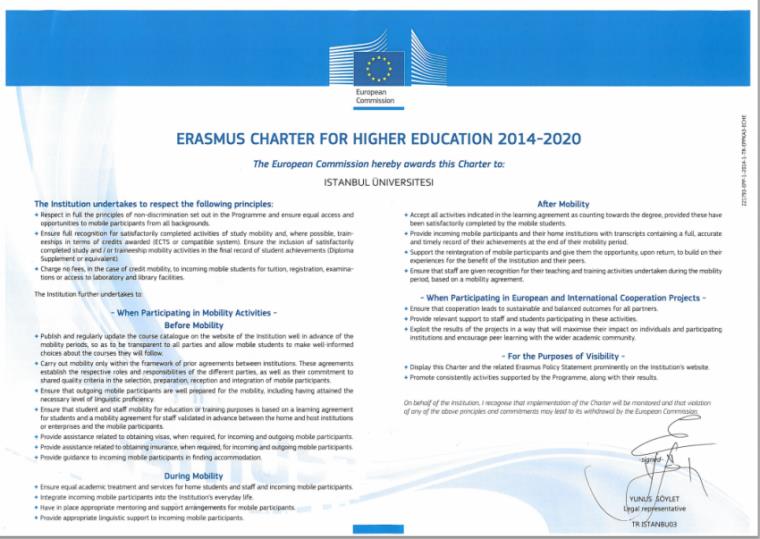Kadromuz
| Erasmus Kurum Koordinatörü | Doç. Dr. Ayşe Zişan Furat | erasmus@istanbul.edu.tr | +90 212 440 00 00 / 11222 |
| Şef | Lale MERTTÜRK | lale.mertturk@istanbul.edu.tr | +90 212 440 00 00 / 10760 |
| Gelen Öğrenci /Personel/KA107 | Öğretim Görevlisi Mustafa KAPLAN | mustafa.kaplan@istanbul.edu.tr | +90 212 440 00 00 / 10272 |
| Staj/Giden Personel Hareketliliği | Serap Elpe | serap.elpe@istanbul.edu.tr | +90 212 440 00 00 / 10248 |
| 2020-2021 Giden Öğrenci Sorumlusu | Ali ÖZBEN | ali.ozben@istanbul.edu.tr | +90 212 440 00 00 / 12024 |
| 2020-2021 Giden Öğrenci Sorumlusu | Seyit ŞENELDİK | s.seneldik@istanbul.edu.tr | +90 212 440 00 00 / 12024 |
| İkili Anlaşmalar/KA107/EVS | Öğretim Görevlisi Dr. Gamze UŞAR | gamze.usar@istanbul.edu.tr | +90 212 440 00 00 / 12029 |
| 2019-2020 Giden Öğrenci Sorumlusu | Engin DEĞİRMENCİ | engin.degirmenci@istanbul.edu.tr | +90 212 440 00 00 / 10761 |
| 2019-2020 Giden Öğrenci Sorumlusu | İzzet EKİNCİ | izzet.ekinci@istanbul.edu.tr | +90 212 440 00 00 / 10761 |
| | |
Erasmus Charter for Higher Education Belgesi
İstanbul Üniversitesi 2014-2021 yılları arasında Erasmus + Projesi bağlamında geçerli olacak olan 221793-EPP-1-2014-1-TR-EPPKA3-
Istanbul University
Istanbul University [IU] (est. in 1453), renowned as the oldest and the most developed university in Turkey, has been a key fundamental player in advancing Turkish Higher Education. It has been at the forefront of the scientific and social advances in Turkey for centuries. Following its well-known motto of being “The Bridge of Science from the Past to the Future”, IU has maintained its positive influence on the Turkish intellectual and academic circles through the implementation of various education programmes ranging from natural sciences to arts and political sciences to theology. IU has continually strived to enhance the international dimensions of its teaching, research, outreach, service and administration.
IU encompasses 15 faculties and 12 graduate schools along with many other academic units which promote the modernisation of Turkish Higher Education. The increasing number of programmes and courses given in English is an important prerequisite in terms of its internationalisation and transnational competition. Through its English taught programmes, the University attracts exceptional students from all around the world. Today, IU is a home for more than 7,800 international students – the highest number of foreign students of any of the Turkish higher education institutions, as well as 104 international academic staff. The University is one of the 11 research universities in Turkey and rated in the top 500 universities in the world due to its international publications, research and implementation facilities, two Nobel prize winners, and most importantly, more than 300 established partnerships with universities from all around the world. In order to increase its success, IU continues to follow the recent developments in the education and the scientific domain. To this end, the University has a long and distinguished record of being a valued member of several international networks, including Coimbra Group of Universities and the European University Association.
IU’s 2019-2023 strategic plan identifies the following two fields as the main focus of its pursuit for internationalisation: (a) increasing the number of international students and staff on campus and (b) engaging in international competition through research and scientific production. In its pursuit for the implementation of its strategic plan, IU maintains its strong interest in increasing the quality and quantity of mobility while strengthening its partnerships. International engagement is a priority in IU’s quest for improving the quality of teaching, learning, and academic research, which in turn would enhance the university's overall reputation and further improving its worldwide ranking.
National and international recognition, a high institutional profile and its pioneering role in Turkish intellectual and scientific circles enables IU to be a popular partner not only in the region but also around the world. IU benefits also from its institutional ratings and location between the East and the West which also indicates one of its implicit strengths and potential to expand the European Education Area. Thus, academic quality and mutual strategic goals are considered as the main criteria for building longstanding partnerships regardless of geographical space and distance.
Since 2003 Erasmus+ has been regarded as the key component in the University’s modernisation and internationalisation. Ever since its participation as one of the first Turkish pilot universities in the Erasmus Programme in the academic year of 2003/2004, IU has increasingly carried out student, academics and staff exchange. More than 15,000 outgoing and incoming students, staff, lecturers, and trainees have benefited from the Erasmus programme since that time. During that period, IU took the necessary steps to fully comply with the Bologna Process, redesigning and continuously updating its programmes and procedures in accordance with the European and National Qualifications Framework. Diploma Supplement was awarded to IU by the European Commission in December 2012. The European Credit Transfer System (ECTS) has been enacted in all degree programs in order to facilitate transparency and clarity of student qualifications. The number of its interinstitutional agreements has reached 505 in 2020, which includes more than 300 universities from 28 EU member states.
All of IU’s academic and administrative units actively participate in the implementation of its modernisation and internationalisation strategies. The International Academic Relations Unit [IARU] oversees international engagements, and employs the necessary means for advancing the University’s related strategies. In order to increase the number of international research projects, a special unit for supporting the researchers was created. In this regard, Erasmus+ Programme management has been carried out as a shared responsibility of IARU and the International Project Office under the supervision of IU Rectorate. Collaborative relations between the departments bring certain added value to expanding the impact of Erasmus+ Key Actions (KA1, KA2, and KA3) and ensures the participation of different stakeholders in their policy-making and policy-implementation processes.
Heading into the new phase of Erasmus+ Programme 2021-2027, strengthening and diversifying partnerships will continue to play a key role in achieving the strategic goals of IU. Developing efficient partnerships will provide IU community with new mobility and networking opportunities to enhance its academic and professional profile. Encouraging its units to establish long-lasting partnerships, IU aims to create an internationalised campus promoting a high degree of cultural diversity and enable both local and international students to develop intercultural competences by interacting and sharing their personal experiences.
Acknowledging the international dimension as one of the most important quality criteria, IU is committed to further implement its official vision of becoming a leading university with its education at a global level and its research shaping the world. This vision will be operationalised by strengthening its international collaborations, broadening its education potential through joint/double degree programmes, increasing its research capacity, empowering its community through new mobility opportunities, and modernising its institutional and educational structure by accommodating itself to the new developments in the European Education Area. Thus, IU identifies the following topics among the priorities which would enhance its modernization, and lay the foundations for its internationalisation as well as its quality improvement:
● prioritising cross-border cooperation with universities and scientific organisations around the world in order to modernise its education and research infrastructure in support of expanding the European Education Area.
● ensuring visibility of the opportunities offered in the frame of Erasmus+ Programme to enable equal and equitable access for its members.
● promoting the inclusion in the Erasmus+ activities of underrepresented groups, refugees as well as students and staff with disabilities.
● continuing to provide full recognition of the acquisitions in the Erasmus+ mobility programmes in order to support the beneficiaries’ advancements in their academic and professional careers.
● establishing long-lasting partnerships in order to develop transnational teaching activities such as double/joint degree programs which can respond to the modern challenges and the need to keep up with the technological progress.
● promoting the concepts of the new Erasmus+ period by becoming actively involved into digitalisation and blended mobility as well as the European Student Card initiative.
● participating in strategic networks and alliances which would bring long-lasting effects for implementing innovative practices, exchanging good practices, and supporting policy development.
● undertaking an active role in promoting and offering opportunities for employing 21st century skills, i.e. learning and innovation skills, digital literacy skills, and career and life skills, as well as for improving language and intercultural competencies.
In order to ensure the visibility and the dissemination of Erasmus+ Programme principles, IU publishes the Erasmus Charter for Higher Education and the Erasmus Policy Statement on its Official Erasmus+ web page at https://erasmus.istanbul.edu.tr/tr/content/erasmus/european-policy-statement


